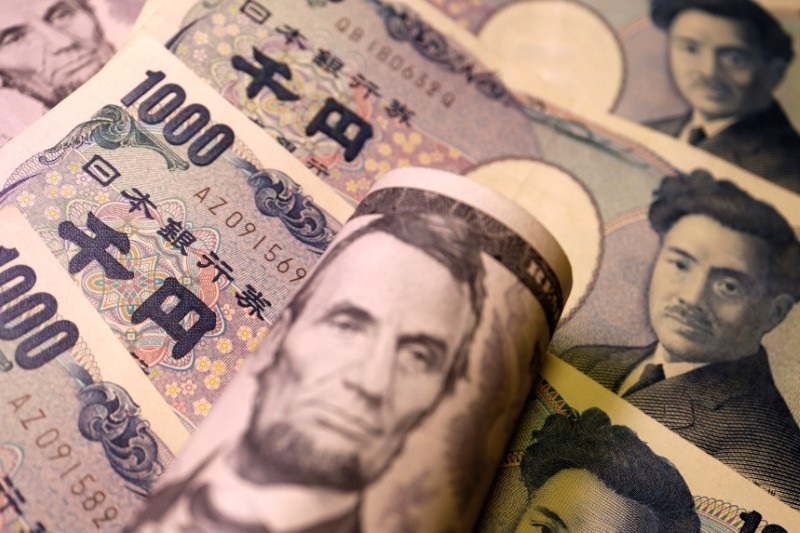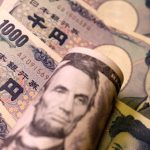TOKYO (Reuters) -The dollar hovered close to a one-week high against other major currencies on Friday, after the biggest drop in U.S. jobless claims in close to a year allayed fears of a looming economic downturn.
The U.S. currency was steady against the Japanese yen following a three-day rebound, supported by a spike in Treasury yields as Thursday’s firmer-than-expected employment data spurred a paring-back in bets for Federal Reserve interest rate cuts this year.
The yen and fellow safe-haven currency Swiss franc hung near one-week lows as stock markets in Asia and Europe rose, while riskier currencies such as the Australian dollar and sterling edged up.
Markets have endured a turbulent week, triggered in large part by surprisingly soft U.S. payrolls figures a week ago that sent global stocks tumbling, while demand for the safety of assets such as the yen and the franc sent those currencies surging to their highest since the start of the year on Monday.
“The prospect of having a pure risk-on environment, pro carry for FX, for the second half of this year, is much less interesting given our forecasts are more conservative on the dollar/yen and the euro/Swiss,” said UBS FX strategist Yvan Berthoux.
“We don’t expect more significant unwind to come. The washout has been quite clear in this environment and we do expect to play further downside.”
The dollar edged down 0.1% to 147.175 yen as of 0837 GMT, on course for an advance of around 0.5% this week, what would be its first weekly rise in six.
Against the Swiss franc, it eased 0.1% to 0.8656 franc, on track for a 1% weekly advance.
Data on Thursday showed the number of Americans filing new applications for unemployment benefits fell more than expected last week, calming fears the labour market was unravelling and reinforcing that a gradual softening remains intact.
The odds of the Fed cutting interest rates by 50 basis points at its next policy meeting on Sept. 17-18 fell to 54%, from 69% a day earlier, with a 25-basis point cut now seen as having a 46% probability, according to the CME Group’s (NASDAQ:CME) FedWatch Tool.
UNWINDING OF SHORT YEN DONE?
The yen had shot higher this month, reaching the strongest since Jan. 2 at 141.675 per dollar on Monday, as an unwinding of short positions snowballed, following a surprise rate hike by the Bank of Japan amid weakness in U.S. economic indicators.
Commodity Futures Trading Commission figures later on Friday will give a clearer indication of the extent of yen buying that has taken place.
The dollar index, which measures the currency versus six others, was 0.1% lower at 103.19 following three days of gains.
The euro was slightly lower at $1.09165, up 0.1% from a week ago. On Monday, it soared as high as $1.1009 for the first time since Jan. 2.
Sterling edged up 0.1% to $1.2767, after a 0.49% rally overnight that yanked it back from a more than one-month low. However, it remained on course for a 0.4% slide this week, which would be a fourth straight week of declines.
The Aussie was stable at $0.65930 after earlier touching $0.6605 for the first time since July 24, given additional support from the Reserve Bank of Australia governor’s hawkish comments a day earlier. It is up 1.24% this week.

The New Zealand dollar reached a three-week high of $0.6035 before last trading up 0.1% on the day at $0.6023. That’s in spite of a drop in inflation expectations that has traders now pricing 80% odds of a quarter point rate cut when the central bank sets policy on Wednesday.
Elsewhere, leading cryptocurrency bitcoin reached a one-week high of $62,717, and last traded about 2.6% higher at $61,042. For the week, it was up about 3.2%.
To read the full article, Click Here

